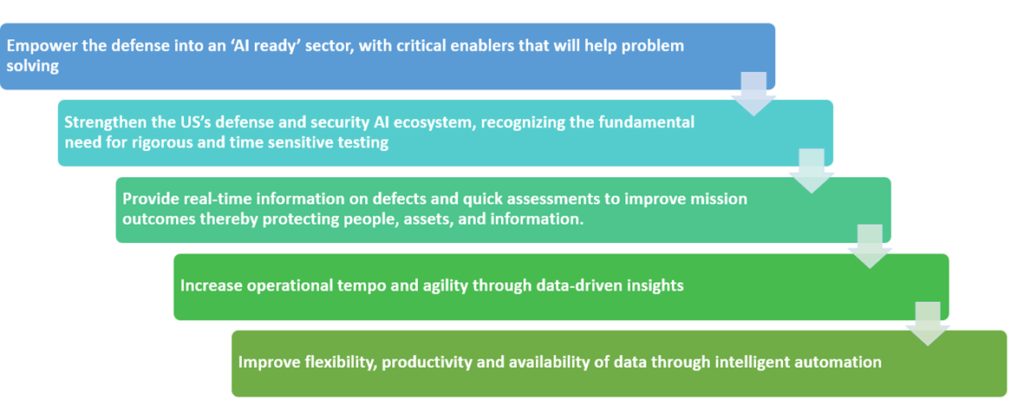
The fusion of human ingenuity and AI
Gone are the days when you could only rely on traditional methods for safeguarding nations. Today’s defense forces carry out challenging and intricate tasks under erratic and dynamic conditions resulting in an urgent need for modern development and testing strategies.
To succeed, the defense needs to build human intelligence which is aided, enhanced, and augmented with AI and ML capabilities. AI can enhance the testing and quality assurance (QA) processes to ensure improved reliability, precision, and security of crucial defense operations.
Let’s explore the value of AI testing for defense and understand why a strong QA plan is necessary for more intelligent defense solutions.
Visual Summary
A Quick Look at the Failures in Defense Due to Lack of Quality Testing
There are numerous examples of potential consequences of insufficient application testing in the U.S. military.

All these errors could have been avoided if the systems were properly tested and validated. According to the Artificial Intelligence in Military Market report, AI in the military market is estimated to be USD 9.2 billion in 2023 and is projected to reach USD 38.8 billion by 2028, at a CAGR of 33.3%.
Priority Outcomes through AI
How can testing solutions help defense? Our objectives and priority outcomes are to:

Through the adoption of AI-enabled testing, our Armed Forces can modernize and rapidly transition into an agile and intelligent force.

Defense forces capture massive amounts of surveillance data and confidential intelligence from a variety of sources and IoT-connected equipment, such as satellites, drones, radars, and cyberspace. By integrating IoT automated testing into such surveillance and threat monitoring systems, defense forces can validate the reliability of these systems, identify any patterns and monitor potential threats. This allows for effective and proactive defense tactics and increased threat response capabilities.
The defense sector relies heavily on effective communication for successful mission execution, coordination among forces, and ensuring real-time situational awareness.
Testing an ecosystem of intelligently connected devices poses significant challenges.
Functional Testing, which includes Performance testing, Cross-browser testing, and cross-device testing allows the defense systems to undergo extensive testing, minimizing the risk of catastrophic failures during mission-critical operations.
For functional and Usability testing, Webomates has an IoT lab setup for intensive testing of the functionality, usability, accessibility of heterogeneous devices, and networks of these IoT devices.
Time is of the essence in the defense sector. AI-powered Intelligent Automation Testing solutions will empower the entire force since they will reduce redundant workloads. Defense forces can deploy new systems and updates faster, and also ensure timely response and adaptation to new threats and challenges.
Shift Left Testing speeds up software releases by testing frequently and early in the development process. This method finds issues faster and reduces unexpected outcomes at the end of development.
One of the critical defense applications for AI technology is cybersecurity, as these attacks can lead to the loss of highly sensitive and confidential data. By leveraging AI testing, defense forces can strengthen their cybersecurity and protect their assets, ensuring that sensitive data is secure and the organization is not compromised
You can take the help of Webomates’ penetration testing, Security testing, Exploratory Testing, and Performance Testing and prevent such cyber attacks.
Decision making especially in high-stress situations is difficult. And defense forces rely on systems that use AI and ML algorithms to analyze historical and real-time information and interpret data.
These systems need to undergo extensive testing to be able to evaluate risks and help the forces make informed decisions.
The defense sector works with the motto – ‘Do more with less’ as it operates under strict timelines along with budgetary constraints and must make optimal use of limited resources.
Depending on the requirements of the application, Regression testing along with Exploratory testing can be done on various scales. By pinpointing bottlenecks and highlighting potential improvement areas, they offer valuable test insights into system performance. As a result, defense organizations can optimize their operations, reduce costs, and ensure the most efficient use of resources.
With AI-powered testing techniques, defense forces can switch from reactive to proactive maintenance strategies.
AI testing techniques like defect prediction and self-healing testing can be used by warfare systems including weapons, sensors, navigation, aviation support, and surveillance to identify deviations from expected behavior and take immediate remedial actions. This proactive approach enables teams to handle problems in advance, which reduces downtime and helps them avoid costly consequences.
By automating code validation, deployment validation, and test execution, AI testing can decrease manual effort and improve system resilience as a whole. Continuous testing is an integral part of the CI/CD pipeline, that can be integrated into the defense application’s development lifecycle. Combined with Shift Left Testing, it ensures that the functionality, performance, and security of warfare systems are continuously validated.
Success Story
With our exemplary work with the esteemed US Air Force, we have demonstrated our ability to help organizations achieve scalability and agility while overcoming the typical traditional testing bottlenecks. Webomates has successfully completed SBIR Phase 1 and Phase 2 with the US Airforce.
Webomates’ Testing as a Service (TaaS) – also known as On-Demand testing service – helps you get clear visibility into your testing data, outcomes, and valuable insights by combining applications and data into a single platform.
We work with unwavering dedication to understand your unique needs and provide customized solutions to ensure the success of your application. Take a look at this animation and know the three easy steps you can take to AI automate your application.
To find out more about what Webomates Intelligent Testing services can do for your business, get In touch with us today.
Tags: AI Testing, AI Testing in Defense, Strengthening National Security
Test Smarter, Not Harder: Get Your Free Trial Today!
Start Free Trial
Leave a Reply